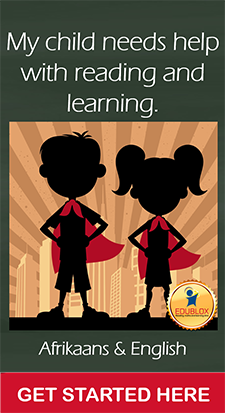

“The way parents respond to report card results can play an important role in how their children perform in the next school year,” says du Plessis. She encourages parents to set aside quality time to spend with their child discussing their performance in 2015 and setting academic goals for 2016. “Ideally this should not be done at the time when final results are received and not in January when it is too late. There is great peace of mind for parents who know that they have put a structured plan in place to help their child reach their full potential, whether they are scoring an average of 75% and could score 90% or if their goal for the following year will simply be to pass every subject.”
If a child has performed poorly, it is recommended that they have a reading test. Reading tests are as important as eye tests and hearing tests, says du Plessis. “Testing reading is a useful way for parents to find out if their child has a visual or auditory processing problem, which is different from having a problem with sight or hearing. If a child struggles to accurately process what they read, the problem is not in their eyes and cannot be solved with glasses. Equally, an auditory processing problem will not be resolved with a hearing aid. Cognitive skills development is required to improve the brain’s ability to accurately process information.” Typical symptoms of visual or auditory processing problems are reversal of letters, losing one’s place when reading or struggling to blend the individual sounds in a word, such as c-a-t. “Avoid online and computerised reading tests, search for a thorough reading test that will help you to find suitable, proven intervention strategies to resolve learning problems.”
Extra classes that provide curriculum-based support cannot solve learning problems caused by deficits in cognitive skills, warns du Plessis. “Revising different aspects of a subject can only be done once the deeper problems are resolved through cognitive skills development. Attention, processing, memory and reasoning are foundational skills that need to be in place before any subject can be sufficiently understood.
If your child will start Grade 1 in 2016 you will need to check, not only that they have the correct school uniform and stationary but also if they are ready for this new chapter in their life. “Children going into Grade 1 should have the language skills and a sufficient vocabulary to learn to read and spell. They should be able to interpret directions, be able to copy from the board, follow verbal directions and be able to count well. Fine motor skills, like cutting with scissors, copying simple forms and colouring in are fundamental to writing,” says du Plessis.
Grade 3 is the final year of what is known as the Foundation Phase. “If your child is starting Grade 3 in 2016 this will be the last year for them to really make sure that their reading is up to standard before they begin Grade 4, when the subject load and work load increase substantially, and they have to write formal tests and exams,” says du Plessis. “It’s easier to help a child overcome learning problems in Grade 3 before they reach Grade 4, which is the crucial year for parents to ensure their children have effective study methods.”
Parents whose children pass comfortably should keep in mind that such results are low compared to international standards. “Learners who average 60 to 70 percent in South Africa may not pass the grade in other countries. Domestically your child has had marginal success, however these are local standards which do not match up internationally,” says du Plessis.
In the first few years of Primary School parents are highly involved in their child’s academic development and will spend time listening to them read aloud or helping them to find resources for school projects. In order to allow a child to fully progress du Plessis encourages parents to gradually reduce homework support. By Grade 6 a child should be fully empowered with the right attitude to take responsibility for their own academic success and work independently on school projects. “Any type of learning problem should ideally be resolved by Grade 6 because at this stage children are expected to be independent learners,” says du Plessis.
Parents of children who are high achievers have a role to play too, says du Plessis. “These children require additional challenges and enrichment, not only during term time but also in the school holidays. Chess clubs, spelling bee competitions and reading eisteddfods provide additional stimulation for learners who consistently come top of their class,” concludes du Plessis.
Edublox are leading specialists in cognitive development with 22 reading and learning clinics across Southern Africa. Edublox offers multisensory cognitive training, aimed at developing and automatising the foundational skills of reading, spelling and Mathematics. For more information about Edublox visit www.edublox.co.za.






Leave a Reply